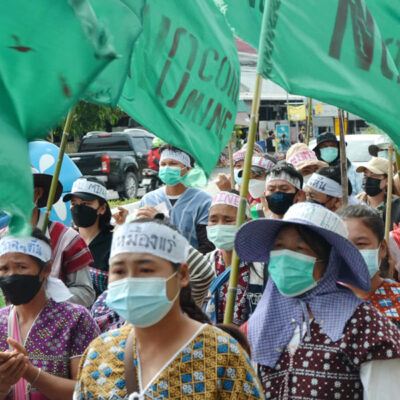Myanmar has a deadline: This Saturday, the government needs to report to the highest court of the United Nations on how it is preventing further acts of genocide against the Rohingya. Tragically, it will be kept secret from those most affected by what it has to say.
I am Rohingya, part of the predominantly Muslim ethnic minority that Myanmar’s government has persecuted for decades and attacked in 2017, killing thousands and sending more than 730,000 fleeing across the border to Bangladesh.
My family fled Myanmar in 1995 when I was three years old because of persecution by the military government. Living in Thailand and then Canada, I have fought for justice for my people back home.
This led me to the International Court of Justice at the Hague last December. There, I listened to Aung San Suu Kyi, the de facto head of the Myanmar government, defend the military against genocide allegations. The case had been brought by the West African nation of The Gambia, which recognizes that genocide committed anywhere is a peril to humanity everywhere. Even though she won a Nobel Peace Prize for her non-violent efforts for democracy and ethnic reconciliation, Aung San Suu Kyi has forgotten this truth. Incredibly, I watched from a few feet away as she rebuffed the charges of genocide and refused to even utter the word “Rohingya” when she testified.

In January, in one of the first positive signs we’ve seen in these terrible three years, the court unanimously issued provisional measures demanding that Myanmar take several actions to protect the Rohingya as the case makes its way through the judicial process. Notably, the court ordered Myanmar to prevent future acts of genocide, preserve evidence of wrongdoing, and report on the steps it has taken to comply with these measures. Unfortunately, such reports usually remain secret.
Far from being just a piece of bureaucratic paperwork, the report is a source of hope for my community and other ethnic groups in Myanmar who have suffered under the military. This court’s order shows that somebody, somewhere in the world, is starting to hold the government accountable for its heinous actions, making sure that the crimes against us are not forgotten. In February, when I traveled to see my fellow Rohingya brothers and sisters in the refugee camps in Bangladesh, everyone asked the same questions: “When will we get our justice? When will we go home?”
Those questions are even more pressing now, during the COVID-19 pandemic. Rohingya refugee camps in Bangladesh are especially vulnerable, as are villages and camps for internally displaced people in Myanmar. Military attacks on Myanmar’s other ethnic communities continue, despite UN Secretary General Antonio Guterres’s call for a global ceasefire in the face of the pandemic. In Myanmar, we cannot get reliable information on what horrors the military inflicted on our community in 2017, or what the country is doing now to address the crimes the military committed. People who push for justice are attacked; journalists who cover the health crisis are jailed; and many aid organizations are kept out of the areas where the genocide was committed. And on Facebook, misinformation and hatred against our community abound.
We expect Myanmar’s report will attempt to whitewash the genocide and highlight half-measures to appear compliant with the court orders. But even such a document would be an acknowledgment by Myanmar that the world is watching.
The UN Security Council must use its power to make the report public and hold an open debate about the genocide and repression in Myanmar. The Council should demand that journalists, independent investigators and aid organizations have unfettered access to Rakhine state, where much of the violence against my community has been committed.
And with the pandemic spreading, the UN should demand an end to the government’s on-and-off internet bans that deprive my community and others from critical lifesaving information. At the same time, Aung San Suu Kyi should back calls for a nationwide ceasefire between the military and ethnic minorities, who continue to face unspeakable horrors, especially in Rakhine and Chin States.
There can be no justice for the Rohingya until we have transparency on how Myanmar plans to reduce the risk of genocide. After failing to address decades of persecution, the international community owes the Rohingya at least this much.
Yasmin Ullah is president of the Rohingya Human Rights Network, a human rights advocacy group.

